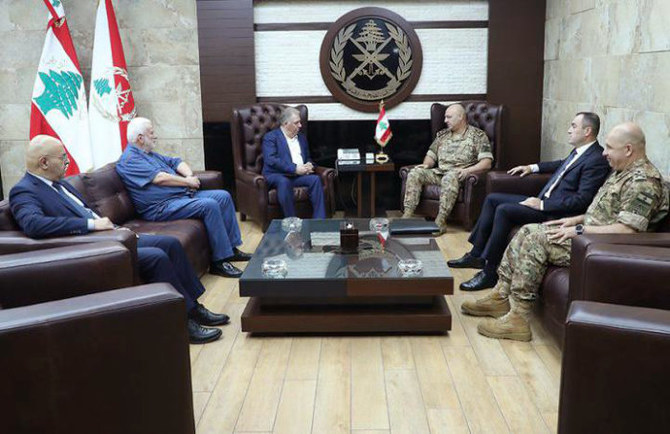BEIRUT: Following days of fighting in Lebanon’s largest camp for Palestinian refugees, which left several people dead and dozens wounded, a ceasefire was declared on Monday.
It followed a meeting between Brig. Gen. Elias Al-Baysari, Lebanon’s acting general security chief, and representatives of the Joint Palestinian Action Committee, which includes members of rival Palestinian factions and the Hamas movement, Lebanon’s General Security Directorate said.
Al-Baysari pledged that Lebanese authorities “will not stand idle in the face of what is happening in the Ain Al-Hilweh camp, as it is subject to the Lebanese sovereignty.”
He added: “What’s happening is very dangerous and if the fighting continues it will turn into a draining crisis. The situation in Lebanon cannot handle additional crises.
“The issue of turning in the wanted members who are suspected of assassinating (Abu Ashraf) Al-Armoushi (a Fatah military general) is the responsibility of the Lebanese state, as it is the one that sets the deadline and acts if they are not handed over.”
Al-Armoushi and four of his bodyguards were killed in an ambush at the camp in July.
Al-Baysari said extremist groups “don’t have the right to disturb the security of the camp, of (the city of) Saida and of the surrounding area, turning the place into a refuge for terrorists and (Daesh) members of all nationalities. The Fatah Movement doesn’t have the right to replace the state.”
Also on Monday, Ashraf Dabbour, the Palestinian ambassador to Lebanon, met Gen. Joseph Aoun, the commander of the Lebanese Armed Forces. Fathi Abou Al-Aradat, secretary of Fatah, was also at the meeting. The participants discussed the latest developments at the camp, Palestinian embassy officials said.
Azzam Al-Ahmad, a member of Fatah’s central committee and general supervisor of Palestinian affairs in Lebanon, was expected to arrive in Beirut on Monday night.
Earlier on Monday, there were clashes at Ain Al-Hilweh for a fifth day between Fatah militants and members of extremist groups, during which eight people were killed. In addition, 128 were injured, including six Lebanese Army soldiers. The dead included four Fatah militants, two members of extremist groups, a Lebanese civilian and a Palestinian civilian.
One of the extremists who died was identified as Ezzeddine Daoud, one of the suspects wanted in connection with the killing of Al-Armoushi. He was taken to Al-Raee Hospital in Saida, where army intelligence was waiting to arrest him, but he died of a head injury.
Meanwhile, rival factions in Ain Al-Hilweh denied targeting a Lebanese army base near the entrance to the camp on Sunday night. Lebanese military officials said three rockets hit two military sites near the camp, injuring five soldiers, one of whom remains in a serious condition.
Palestine Liberation Organization representatives in Lebanon condemned the targeting of Lebanese forces at Ain Al-Hilweh. They described it as “a suspicious act that affects the Palestinian national cause and serves the enemies of the Palestinian and Lebanese peoples.”
The Coalition of Palestinian Forces in Lebanon also denounced the targeting of the army bases as “a suspicious act with dangerous implications.”
The Hamas press office in Lebanon denied reports that the movement, along with Palestinian Islamic Jihad and Hezbollah, “were backing the armed groups in the Ain Al-Hilweh camp in order to take over the Palestinian decision in the Palestinian camps in Lebanon.”
It said Hamas “works with all the Palestinian and Lebanese factions and forces, in addition to the Lebanese security apparatuses and the Palestinian ambassador to Lebanon, to secure a ceasefire and preserve the camp, its residents and the neighboring Lebanese areas.”
It added: “We will continue our efforts with all loyal sides to ensure security and stability inside the camp.”
















